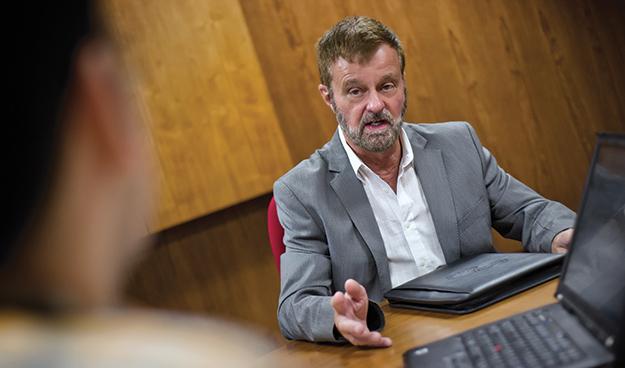Winter 2016: Energy Evolution
From carbon dioxide conversion to landfill mining, researchers at UTA are seeking viable alternative energy options.
Skip to content. Skip to main navigation.
From carbon dioxide conversion to landfill mining, researchers at UTA are seeking viable alternative energy options.
Found in everything from space shuttles to dental fillings, composite materials have thoroughly infiltrated modern society. But their potential is still greatly untapped, offering researchers ample opportunity for discovery.
Within the particle showers created at the Large Hadron Collider, answers to some of the universe’s mysteries are waiting.
Model systems like pigeons can help illuminate our own evolutionary and genomic history.
UT Arlington's tiny windmills are bringing renewable energy to a whole new scale.
The stability of our highways, pipelines, and even manholes is reaching a breaking point.
Scientists believe they have discovered a subatomic particle that is crucial to understanding the universe.
UT Arlington researchers unlock clues to the human body’s most mysterious and complex organ.
UT Arlington researchers probe the hidden world of microbes in search of renewable energy sources.
Wounded soldiers are benefiting from Robert Gatchel’s program that combines physical rehabilitation with treatment for post-traumatic stress disorder.
Tiny sensors implanted in the body show promise in combating acid reflux disease, pain and other health problems.
Nanotechnology researchers pursue hybrid silicon chips with life-saving potential.
Biomedical engineers combat diseases with procedures that are painless to patients.

Frank Lewis
New technology developed at the UTA Research Institute (UTARI) could allow everything from airplane autopilots to vehicle emission controls to make informed, real-time decisions independently.
Frank Lewis, a professor in the Electrical Engineering Department and at UTARI, developed an innovative process that allows a device to make control decisions in reaction to a set of variables that changes based on each previous decision. Called Integral Reinforcement Learning (IRL), it involves a batch process that requires taking in a set of data before updating the control law.
"Optimal feedback controllers allow a device to use the minimum energy necessary while saving time and fuel," Dr. Lewis explains. "The advantage of using adaptive Integral Reinforcement Learning is that a device now can have optimal controls by looking within the system and calculating changes in real-time rather than offline, where changes can only be made when the device is no longer in use."
Lewis, along with Draguna Vrabie from United Technologies and Kyriakos Vamvoudakis from the University of California at Santa Barbara, was issued a patent to develop new technology for IRL to enable decisions to be made continuously in real time and online, providing greater autonomy and a speedier response.
According to Dr. Vamvoudakis, adaptive integral reinforcement may someday allow machines to adapt to, and work in, increasingly difficult situations: "Efficiency will be defined by the potential to adapt autonomously in complex environments to enable capabilities beyond human limits," he says.